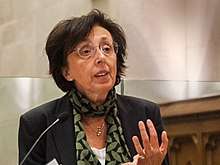Giulia Galli
Giulia Galli is a condensed-matter physicist. She is the Liew Family Professor of Molecular Engineering and Professor of Chemistry at the University of Chicago and senior scientist at Argonne National Laboratory. She is also the director of the Midwest Integrated Center for Computational Materials. She is recognized for her contributions to the fields of computational condensed-matter, materials science, and nanoscience, most notably first principles simulations of materials and liquids, in particular materials for energy, properties of water, and excited state phenomena.
Giulia Galli | |
|---|---|
 | |
| Alma mater | International School for Advanced Studies |
| Awards | Member of the National Academy Sciences Member of the American Academy of Arts and Sciences Fellow of the American Physical Society Fellow of the American Association for the Advancement of Science |
| Scientific career | |
| Fields | Physics Chemistry Materials Science Molecular Engineering |
| Institutions | University of Chicago |
Education
Galli earned her PhD in physics in 1987 from the International School for Advanced Studies in Trieste, Italy. She held postdoctoral fellowships at the University of Illinois at Urbana-Champaign, and the IBM Research Division in Zurich, Switzerland.[1]
Career
Galli joined the Swiss Federal Institute of Technology (EPFL) in Lausanne, Switzerland, in 1991 first as senior researcher and then as senior scientist. She moved to Lawrence Livermore National Laboratory in Livermore, California in 1998, where she was the founding group leader of the Quantum Simulations Group that she led until 2005. From 2005 to 2013, Galli was Professor of Chemistry and Physics at University of California, Davis. While at UC Davis, she was the chair of Deep Carbon Observatory's Extreme Physics and Chemistry Directorate.[2] In 2014 she joined the University of Chicago's Institute for Molecular Engineering (now Pritzker School of Molecular Engineering) as Liew Family Professor of Electronic Structure and Simulations. She is also Professor of Chemistry at the University of Chicago and senior scientist at Argonne National Laboratory. She is the director of the Midwest Integrated Center for Computational Materials (MICCoM), which develops and disseminates interoperable open source software, data and validation procedures for the simulation and prediction of functional materials.[3] MICCoM was established by the Department of Energy in 2015 and renewed in 2019.[4]
Research and achievements
Galli's research activity focuses on the development and use and computational methods to understand and predict the behavior of solids, liquids and nanostructures from first principles.[5] Her method developments include electronic and vibrational spectroscopies and thermal transport. Her theoretical studies of excited state properties of matter focus on the prediction of optimal systems for harvesting sunlight. Her work also involves simulation frameworks to investigate thermal transport in nanostructured materials, which are based on first principles molecular dynamics simulations and the Boltzmann transport equation. In addition to energy, Galli's research covers problems related to water resources at ambient conditions and in severe environments. Other areas of interest include phenomena and materials used to realize quantum information technologies.[6] Galli's software activities are focused on the development of the WEST code (large-scale electronic structure within many-body perturbation theory)[7] and participation in the development of the Qbox code (ab initio molecular dynamics) led by Francois Gygi at University of California, Davis,[8] both of which are supported by MICCoM.
Honors and awards
Galli is a Fellow of the American Physical Society, the American Association for the Advancement of Science, the American Academy of Arts and Sciences,[9] as well as a member of the National Academy of Sciences;[10] she is the recipient of the Lawrence Livermore National Laboratory Science and Technology Award, the Department of Energy Award of Excellence,[11] the 2018 Materials Research Society Theory Award for "the development of advanced first-principles simulation methods and their application to understanding, prediction, and design of complex nanostruuctured materials,"[12] the 2019 David Adler Lectureship Award in the Field of Materials Physics from the American Physical Society for "the invention of methods, especially for the enhancement of ab initio molecular dynamics, to understand, predict, and engineer the electronic and structural properties of materials,"[13] the 2019 Nelson W. Taylor Award,[14] the 2019 Feynman prize for nanotechnology (theory),[15] and the 2019 Tommasoni-Chisesi prize.[16]
References
- "Giulia Galli Bio". University of Chicago. Retrieved 16 January 2018.
- "Galli Caltech Profile". California Institute of Technology. Retrieved 23 January 2018.
- "MICCoM Organization". Midwest Integrated Center for Computational Materials. Retrieved 16 January 2018.
- "US Department of Energy renews Midwest Integrated Center for Computational Materials". Argonne National Laboratory. Retrieved 17 July 2019.
- "LLNL Review". Lawrence Livermore National Laboratory. Retrieved 14 February 2018.
- "Galli Group Research". University of Chicago. Retrieved 16 January 2018.
- "West Code". Argonne National Laboratory. Retrieved 16 January 2018.
- "Gygi Research". University of California, Davis. Retrieved 23 January 2018.
- "Six UChicago scholars elected to American Academy of Arts and Sciences". Apr 27, 2020. Retrieved 2020-05-02.
- "2020 NAS Election". National Academy of Sciences. April 27, 2020. Retrieved 2020-04-29.
- "Galli Profile". Argonne National Laboratory. Retrieved 23 January 2018.
- "Materials Theory Award Webpage". Retrieved 18 October 2019.
- "David Adler Lectureship Award in the Field of Materials Physics". American Physical Society. Retrieved 17 July 2019.
- "'Materials from First Principles' theme for 2019 Nelson W. Taylor Lecture Series". Penn State University. Retrieved 17 July 2019.
- "Feynman prize in Nanotechnology".
- "Aula Amaldi Dipartimento di Fisica: Fondazione Sapienza - Tomassoni Chisesi Physics Prize". Retrieved 11 February 2020.
External links
- "MRS Material Theory Award 2018". Institute for Molecular Engineering, University of Chicago. 2019. Retrieved 2019-10-18.
- "Giulia Galli". Institute for Molecular Engineering, University of Chicago. 2018. Retrieved 2018-01-23.
- "Research Group website". University of Chicago. 2018. Retrieved 2018-01-23.
- "Google Scholar Profile". 2018. Retrieved 2018-01-23.
- "Midwest Integrated Center for Computational Materials (MICCoM)". MICCoM. 2018. Retrieved 2018-01-20.
- "Qbox Code". qboxcode.org. 2018. Retrieved 2018-01-20.
- "WEST Code". University of Chicago; Argonne National Laboratory. 2018. Retrieved 2018-01-20.